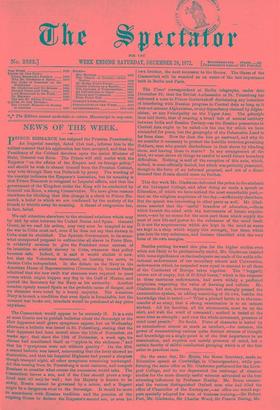The Cesarevitch would appear to be seriously ill. It is
a rule at most Courts not to publish bulletins about the Sovereign or the Heir Apparent until grave symptoms appear, but on Wednesday afternoon a bulletin was issued in St. Petersburg, stating that the Heir Apparent had been unwell since the 19th of November, six weeks ago; that since the 19th of December, a week ago, his disease bad manifested itself as " typhus in the abdomen ;" and that his " symptoms were not without gravity." On the 26th a second bulletin was issued, announcing that the fever showed no diminution, and that his Imperial Highness had passed a sleepless though tranquil night, all other symptoms remaining unchanged. All this coming from St. Petersburg is most ominous, and compels Russians to consider what course the succession would take. The Cesarevitch leaves a son, and if the Czar should prove a long- lived man all ma) be well ; but his Majesty is known to be sickly, Russia cannot be governed by a minor, and a Regent might be a dangerous rival to the Sovereign. It would be more in accordance with Russian tradition and the practice of the reigning House to declare the Emperor's second son, or even his own brother, the next successor to the throne. The illness of the Cesarevitch will be watched as an event of the last importance both in Berlin and Paris.


































